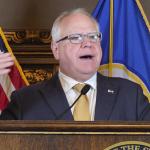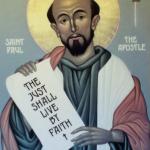Scientizing Ufology: UFO 17
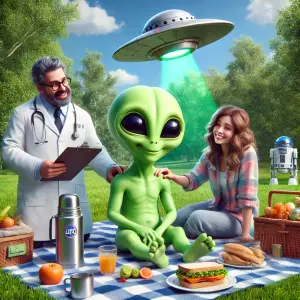
At last! Scientists are inviting ufologists to their barbecues. Since 2017 previously snobby scientists have undergone a change of heart. They are now gladly accepting invitations to UFO barbecues too. By giving “UFO” (Unidentified Flying Object) a new moniker, “UAP (Unidentified Aerial Phenomenon), credentialed scientists can escape the disapproving frowns of their colleagues. Serious scientizing ufology has begun.
Some scientists have not repented. Famed astronomer Neil deGrasse Tyson typifies those scientists who have been turning down invitations to ufology barbecues.
“That’s what the ‘U’ stands for: Un-fucking-identified! O.k.?! You don’t know what it is. Period! … There’s no logical connection between you not knowing what you’re looking at and intelligent aliens coming from another dimension. There is no thread connecting…your ignorance of what you see in the night sky to this other thing that you pulled out of your ass!” (Tyson 2/1/2018).
Despite Tyson’s stand-offish attitude, things are largely changing toward greater amicability. Chemist Robert Powell, executive board member of the Scientific Coalition for UAP Studies, is ready to invite colleagues to a ufology barbecue.
“Attitudes toward UFOs have changed. This is demonstrated by the existence of organizations such as SCU [Scientific Coalition for UAP Studies] and GP [Galileo Project]. The rebranding of the word UFO to UAP was arguably instrumental in that change” (Powell 2024, 140).
What our scientists love is data. Ambitious plans are being made for gathering data through instrumentation, experimentation, and measurement. Scientists swarm around data like pigeons around food scraps in the park.
Where is Scientizing Ufology at the moment?
Recently SUAPS (Society for UAP Studies) conducted its First Annual UAP Studies Conference. ‘Twas a fine event, in my judgment. It included a paper delivered by physics professor Kevin Knuth, a paper he had previously presented to a meeting of astrobiologists. Same paper. Two differing audiences. Things have changed for the better.
Here’s where I think we are on the scientizing of ufology. On the one hand, I applaud the post 2017 turn toward inviting credentialed scientists to marshal serious resources to research UAP. Hooray!
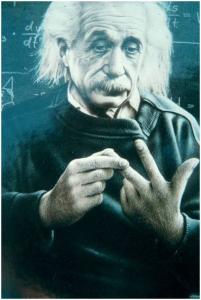
On the other hand, the paranormal / abduction narratives do not fit within the constrictions of the scientific method. Should we expunge these from the UFO phenomenon just so ufology fits the parameters of scientific research? Or should we expand the scientific parameters? If the latter, then we must turn to extra-scientific disciplines, such as the humanities.
”Some UAP appear both mental and physical at the same time,” observes Jensine Andresen. The scientific lens can certainly see what is physical. But the mental is invisible. Should the ufologist include the mental too? (Andresen 2023, 303)
Let me zero in on a particular item. One feature of the UFO experience is the feeling some experiencers report, namely, that they have confronted a reality more real than our everyday reality. Might we think of this as the religious dimension to the UFO phenomenon?
This opens the door of UAP Studies to ontology and metaphysics. How can we pry that door open further and peek into what might be on the other side? I recommend we call the other side the numinous, a term borrowed from Immanuel Kant and history of religions scholars.
Scientizing Ufology? A Caution
The opening of this door toward the numinous lands us back in the ginormous problem faced for four centuries by Christian theologians, namely, the hermeneutical question.
“How can the Christian faith, first experienced and symbolically articulated in an ancient culture now long out-of-date, speak meaningfully to human existence today as we experience it amid a worldview dominated by natural science, secular self-understanding, and the worldwide cry for freedom?” (Peters, GWF, 2015, p.7).
Answering this or similar questions is especially difficult when we equate the modern worldview with the worldview presupposed by natural science. The scientific worldview is constricted by appeal solely to material causes. There is no room here for either God or the paranormal.
Suddenly UAP studies has grown to the size of theology and incorporated some of theology’s problems.
Conclusion
On the one hand, those of us engaged in UAP studies should be grateful for the turn of events. Now scientists are coming to ufology barbecues and bringing trustworthy methods of data collection with them.
On the other hand, the phenomenon itself includes elements not subject to scientific analysis. We dare not exclude for the sake of convenience claims of the paranormal or abduction narratives. We need a method for examining these. We search for an explanation that may require going beyond the fences of strict data gathering.
Because some experiencers feel they are confronting a reality more real than everyday life, we must ask: have we entered a religious dimension?
Patheos SR 1187 UFO 17 Scientizing Ufology
SR 1186 UFO 16 UAP Cryptoterrestrial Hypothesis
SR 1187 UFO 17 Scientizing Ufology
SR 1188 UFO 18 Are UAP from outer space?
SR 1189 UFO 19 Are UAP from future time?
SR 1190 UFO 20 Are UAP from another dimension?
SR 1191 UFO 21 UAP and Ancient Alien Theology
SR 1192 UFO 22 UAP, ETI, and David Bohm’s Physics
SR 1194 UFO 24. A UFO for Christmas?
Ted Peters, “Muslims, Christians, Scientists, and Extraterrestrial Aliens” Theology and Science 21:3 (2023) 345-347; DOI: 10.1080/14746700.2023.2230423.
▓
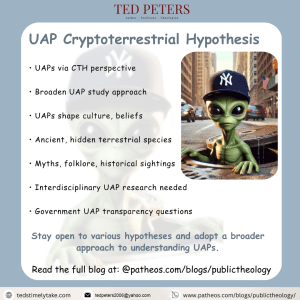 Ted Peters directs traffic at the intersection of science, religion, and ethics. Peters is an emeritus professor at the Graduate Theological Union, where he co-edits the journal, Theology and Science, with Robert John Russell on behalf of the Center for Theology and the Natural Sciences, in Berkeley, California, USA. He authored Playing God? Genetic Determinism and Human Freedom? (Routledge, 2nd ed., 2002) as well as Science, Theology, and Ethics (Ashgate 2003). Along with Martinez Hewlett, Joshua Moritz, and Robert John Russell, he co-edited, Astrotheology: Science and Theology Meet Extraterrestrial Intelligence (2018). Along with Octavio Chon Torres, Joseph Seckbach, and Russell Gordon, he co-edited, Astrobiology: Science, Ethics, and Public Policy (Scrivener 2021). Along with Arvin Gouw and Brian Patrick Green, he co-edited Religious Transhumanism and Its Critics (Lexington 2022). Look for his newest book, The Voice of Public Theology, a collection of previous articles. See his website: TedsTimelyTake.com.
Ted Peters directs traffic at the intersection of science, religion, and ethics. Peters is an emeritus professor at the Graduate Theological Union, where he co-edits the journal, Theology and Science, with Robert John Russell on behalf of the Center for Theology and the Natural Sciences, in Berkeley, California, USA. He authored Playing God? Genetic Determinism and Human Freedom? (Routledge, 2nd ed., 2002) as well as Science, Theology, and Ethics (Ashgate 2003). Along with Martinez Hewlett, Joshua Moritz, and Robert John Russell, he co-edited, Astrotheology: Science and Theology Meet Extraterrestrial Intelligence (2018). Along with Octavio Chon Torres, Joseph Seckbach, and Russell Gordon, he co-edited, Astrobiology: Science, Ethics, and Public Policy (Scrivener 2021). Along with Arvin Gouw and Brian Patrick Green, he co-edited Religious Transhumanism and Its Critics (Lexington 2022). Look for his newest book, The Voice of Public Theology, a collection of previous articles. See his website: TedsTimelyTake.com.
Regarding UFOs, he is author of UFOs: God’s Chariots? Spirituality, Ancient Aliens, and Religious Yearnings in the Age of Extraterrestrials (Career Press New Page Books, 2014). He served as Louisiana State Director for MUON and is currently a member of two UFO investigation organizations, Society for UAP Studies and Scientific Coalition for UAP Studies.
▓
References
Andresen, Jensine. 2023. Hyperconvergenece: Religion, Politics, and UFOs. Independent: https://www.goodreads.com/book/show/197292604-hyperconvergence.
Peters, Ted. 2015. God–The World’s Future: Systematic Theology for a New Era. 3rd. Minneapolis MN: Fortress Press.
—. 2014. UFOs–God’s Chariots? Pompton Plains NJ: New Page Books.
Powell, Robert. 2024. UFOs: A Scientist Explains What we Know and Don’t Know. Lanham MD: Roman and Littlefield.
Tyson, Neil deGrasse. 2/1/2018. Quoted. https://podscripts.co/podcasts/the-cryptid-factor/33-033-the-decade-issue?scroll_to_words=Tyson, The Decade Issue: The Cryptid Factor.



